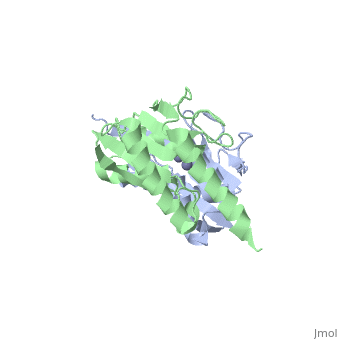User:Eleanor Crabb/Sandbox 1
From Proteopedia
| Line 4: | Line 4: | ||
You can rotate the molecule using your mouse and zoom in and out by holding down the shift key while you move the mouse. | You can rotate the molecule using your mouse and zoom in and out by holding down the shift key while you move the mouse. | ||
| - | You will note that there are two chains in this protein, shown in green and blue. For simplicity let us concentrate on just a <scene name='User:Eleanor_Crabb/Sandbox_1/1z3a_single_chain/1'>single chain</scene>, chain A. To see this click on the link in green. If you hover the mouse over a particular part of the structure, for example, the central zinc atom, you will see a yellow box with a label giving the atom identity. In this example, you will see the label [[Image:elementbox. | + | You will note that there are two chains in this protein, shown in green and blue. For simplicity let us concentrate on just a <scene name='User:Eleanor_Crabb/Sandbox_1/1z3a_single_chain/1'>single chain</scene>, chain A. To see this click on the link in green. If you hover the mouse over a particular part of the structure, for example, the central zinc atom, you will see a yellow box with a label giving the atom identity. In this example, you will see the label [[Image:elementbox.JPG]] |
This is a cartoon representation of the protein, showing a schematic representation of the back bone of the protein. You may be more familiar with the following molecular representations (note in all cases that the H atoms in the molecule are not shown): | This is a cartoon representation of the protein, showing a schematic representation of the back bone of the protein. You may be more familiar with the following molecular representations (note in all cases that the H atoms in the molecule are not shown): | ||
Revision as of 21:59, 8 October 2009
|
The interactive image on the right shows the asymmetric unit of ta zinc containg enzyme with the pdb code 1z3a. (The asymmetric unit is the smallest part of the crystal structure that can be used to generate the unit cell of a crystal and hence the entire crystal structure of a protein - see the asymmetric tutorial at the RCSB Protein Data Bank [1]for more information.)
You can rotate the molecule using your mouse and zoom in and out by holding down the shift key while you move the mouse.
You will note that there are two chains in this protein, shown in green and blue. For simplicity let us concentrate on just a , chain A. To see this click on the link in green. If you hover the mouse over a particular part of the structure, for example, the central zinc atom, you will see a yellow box with a label giving the atom identity. In this example, you will see the label
This is a cartoon representation of the protein, showing a schematic representation of the back bone of the protein. You may be more familiar with the following molecular representations (note in all cases that the H atoms in the molecule are not shown):
- - this gives an indication of the size and shape of the protein
Let us simplify things further by looking at just a of the chain. If you rotate the model you can clearly see the backbone linking the different residues. We now draw a line through the backbone of the chain illustrated as or the alone.
Returning now to . This can be coloured according to:
- the arrangement of the
Finally, focussing now on the zinc atom

